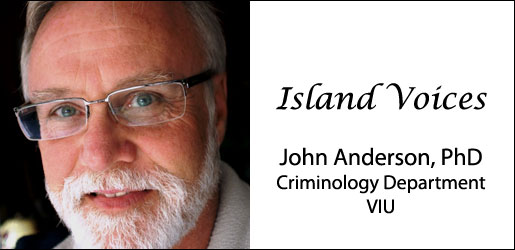John Anderson, PhD
Current Article ∙ Archive ∙ Back to Island Voices
John Anderson, PhD
Dr. John Anderson is with the Criminology Department at Vancouver Island University where he has taught criminology courses since 1989. Since then, he has been Chair for 16 of 20 years. He holds an MA in Criminology from Simon Fraser University and a PhD in Sociology.
His doctoral research explored the realities of men and women who have decided to leave crime and “go straight”. John was responsible for designing and implementing the 2 year Diploma and four year Major in Criminology at Malaspina. He is now collaborating with his Department on developing a Minor in Criminology at VIU.
John has conducted research on sex offender treatment programs, perceptions of sentencing fairness among federal and provincial inmates, the effectiveness of community policing, and implementing national and local strategies for crime prevention.
With faculty and students in Social Services, he is presently working with the Hiiye’yu Lelum Society in Duncan to evaluate a new crime prevention program. John has applied experience in youth corrections, and spent five years working in a maximum-security pre-trial facility for adults in Vancouver.
Aside from his academic publications, John has published over 50 articles on crime and criminal justice in the Vancouver Sun, Globe and Mail, Victoria Times Colonist, and various Nanaimo media.
John Anderson, PhD
Criminology Department
Vancouver Island University
www.viu.ca/criminology
Current Article: March 2011
Competing Claims about Crime in Canada
The media has exposed us to competing claims about the state of crime in Canada. It’s not surprising that many Canadians may be a bit confused.
Last fall, we heard Stockwell Day talk about high levels of “unreported crime”. He was referring to the 2004 General Social Survey conducted by Stats Canada, a telephone survey which uses random-digit dialing to reach about 24,000 households. Nearly 75% of those households contacted agreed to an interview and their collective responses give us some idea about rates of victimization.
Much was made by Mr. Day about the volume of unreported sexual assaults. However, without some necessary qualifications, the finding that 88% of sexual assaults go unreported to the police is indeed alarming . However, the definition of “sexual assault” is posed to the interviewee as follows:
“During the past 12 months, has anyone ever touched you against your will in any sexual way? By this I mean anything from unwanted touching or grabbing, to kissing or fondling.”
Unwanted kissing, touching or grabbing is assaultive behaviour, but it’s hardly the stuff which immediately comes to mind when we think of “sex crimes.” This broad definition in the questionnaire may explain why 24% of respondents reported being victims of this behaviour.
Just over half of the respondents who experienced any violent victimization told Stats Canada that they did not report it to police because the incident “was not important enough”. Similar victimization studies from the United States and the UK have consistently shown that the more serious the crime, the more likely it will be reported to the police.
To further muddle the question of “is crime in Canada getting worse?”, the MacDonald-Laurier Institute (MLI) recently enlisted a former Crown prosecutor, Scott Newark, to write a paper about the work of Statistics Canada, specifically the Centre for Justice Statistics and how that agency reports crime trends to Canadians.
One of Newark’s concerns is the Crime Severity Index (CSI) developed by the Centre of Justice Statistics. It was formulated by the Centre in cooperation with the Canadian Association of Chiefs of Police and other “justice partners”. It helps to answer the question, “Is the severity of crime increasing over time?” This new measure indicates that the rate and severity of crime has been decreasing over the past six years.
Newark objects the “subjective” formula used to calculate the CSI because it depends in part upon the sentence given by the judge. While judicial discretion is a reality, sentencing data shows that more severe prison sentences are assigned to more serious crimes, and often lengthy ones. And here’s news for Scott Neward: judges must be subjective which is why they are called “judges”. Even for those offences where minimum sentences are mandated by law and judges have no discretion, the CSI still shows a declining trend in rate and severity.
What is absent from the mainstream media which has reported on Newark’s paper is the sponsoring organization: the MacDonald-Laurier Institute. The MLI is a “registered charity” compromised of fiscal conservatives who have a penchant for laissez-faire economics. This “think tank” (read “lobby group”) has deep ideological connections to the privatization of public services, government deregulation, and expanding free markets.
If this lobby group can convince Canadians that crime is actually on the increase, voter preferences will accumulate for the federal party promising to “get tough on crime” with billions of your dollars to spend on new prison construction.
Archive
December 2010
Unintended Consequences of Mandatory Minimum Sentences for Pot Growers
April 2010
Pardons
January 2010
Build Schools and Hospitals, Not More Jails


